While many services have spent the weekend working through the government’s new childcare relief subsidy, another week of teaching within a constantly shifting environment rolls around again.
Across Australia, educators continue to innovate and reimagine the way they connect with children and the community, bringing a sense of normalcy and comfort to many in this time of uncertainty.
This week we share how two NSW preschools and their families have responded to the COVID-19 crisis with innovation, compassion and a boosted sense of community.
Inaburra Preschool – rising to the challenge of transformation
A reflection by Christine Tsang, Director of Inaburra Preschool
I am watching a group of seven children and their teacher sit 1.5 metres apart from each other. They have gathered to sing an acknowledgement of country and to share today’s thoughts and ideas.
Their conversation ranges from yesterday’s rainstorm to the friends who are not at preschool today. The children are experts. Experts at sharing their thoughts, experts at decision making and now experts at handwashing, at keeping a distance from each other, and at living with the impacts of COVID-19 in their lives.
This is the new world in many preschools and children’s services across Australia. Two children share their impressions saying; “The whole world’s gone crazy just buying toilet paper” and “It’s germs, different germs that you don’t want to spread to another person.”
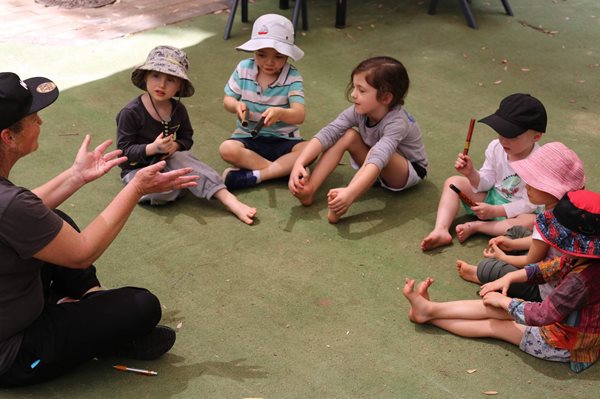 I listen as staff support the conversation and more children express themselves.
I listen as staff support the conversation and more children express themselves.
There is a common theme; “I miss playing with my friends”. As families choose to self-isolate, many services across Australia are seeing attendance rates dropping each day.
Challenging us to listen even more intently
Gunilla Dahlberg speaking at the 2019 ECA Conference urged educators to; “Listen, listen, listen… then listen again”.
Listening is our ‘why’ at Inaburra Preschool.
That’s easy to do when children are at preschool, but what about when they are isolated in their homes?
We have been challenged!
- How do we support children’s friendships when they are not in the same physical space?
- How do we listen and hear children’s voices when many of them are self-isolating in their homes?
- How do we sustain dispositions for learning when the environment is changed?
- How will a sense of wellbeing and belonging be supported for the whole preschool community?
Responding through transformation
There is a saying that ‘The only thing you can really control is how you respond to things out of your control’.
It was obvious we had to transform our structure to meet the changing needs of our community.
When planning this transformation, we started by identifying three aims:
1. We wanted to continue to connect and support every family in a meaningful way, and we knew that this would look different for every family group.
2. We wanted to continue to support children to achieve identified goals for assessment and learning.
3. We wanted to maintain a sense of consistency and routine for children, families and staff at a time of constant change.
Our planning started with two specific external programs; ‘Preschool at Home’ and ‘Communication and Connection Emails’ but very quickly moved to include a third; ‘Zoom into Preschool at Home.’
Preschool at Home
This program is a very simple concept, where we identified which resources we have at preschool that we could share electronically with families in self-isolation.
The list is long and growing, including ideas such as:
- Word/excel documents with make your own bingo games
- Templates for crafts and games such as making paper aeroplanes
- Scavenger hunts for inside and outside
- A list of ideas for backyard or veranda fun
- A daily program schedule of Fundamental Movement Skills
- Links to online songs
- Practice sheets of Auslan for familiar words and songs we use each day at preschool
- Art ideas using items in the home
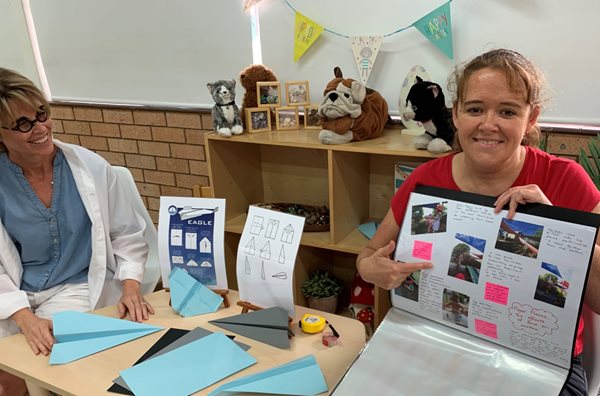 Inaburra educators share paper plane templates and link to the floor book programme
Inaburra educators share paper plane templates and link to the floor book programme
Staff add to the folder daily as new resources are found or created. Resources are emailed home every Friday and families can choose what they play and create together.
In order to extend our connection, families are encouraged to photograph the wonderful things they are doing and email the images to preschool. The Preschool at Home team has three tasks.
- The first is to take the photographs and stories from each family’s email and create a Facebook post for other children and their families to enjoy and be inspired by.
- The second is to create a journal entry for the child which highlights the learning (seen in the photo and shared information).
- The third is to respond to the email and offer support and interactions which maintain the relationship with that family.
Communication and Connection Emails
Every child and their family receive a personalised message via email, checking in, connecting with the latest events in their lives and even talking to siblings.
Images, links or an attachment that is based on the child’s interests and passion may be included.
As an example, this week some children received birthday greetings and e-cards to celebrate their milestone.
We love the interactions we are having through these emails – relationships are made even more special as we often receive follow-up telephone calls from families, “just to hear your voice and have a chat”.
Zoom into Preschool at Home
This week was our first foray into performing and movie making with the iPad as our key communication tool.
We knew that families were looking for quality learning content and a sense of security and belonging for their children while self-isolating, so we planned a live group session.
Using the technology of Zoom we started small with one 15 minute session each afternoon which included a couple of familiar songs and a story using props. While our first attempts were basic, in just a few days we had discovered improved ways to film and build confidence in our performances.
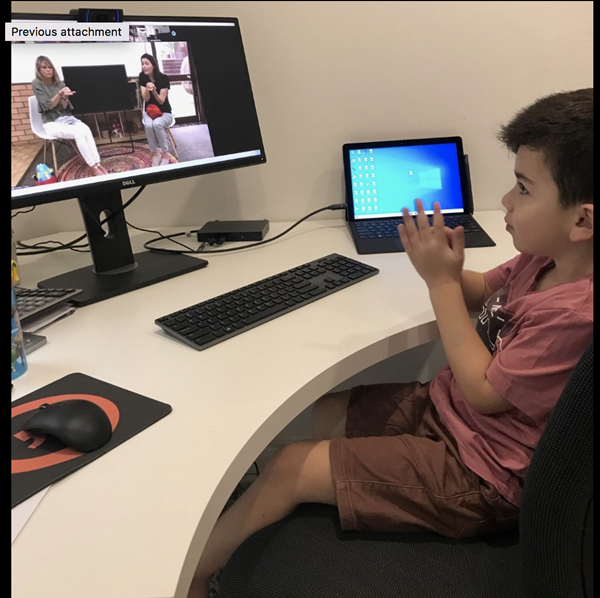 Zoom into Preschool at Home sessions now run for 30min with two sessions each day.
Zoom into Preschool at Home sessions now run for 30min with two sessions each day.
Content is drawn from the email and telephone conversations we have with the children and the images shared through the Preschool at Home Program.
A celebration of new skills
We miss the face to face contact with so many of the beautiful children of Inaburra Preschool. We miss hearing their thoughts, playing games with them and especially miss ‘being’ together.
However, we are thankful every time we see them safe and happy at home, waving hello, signing, singing and clapping along to familiar songs during zoom sessions.
Sharing photos and home life is bringing us closer to each and every family in a way we previously might have shied away from as “too personal.” It has taught us to celebrate the skills we have – in addition to being teachers and educators, we have found we are performers and film-makers.
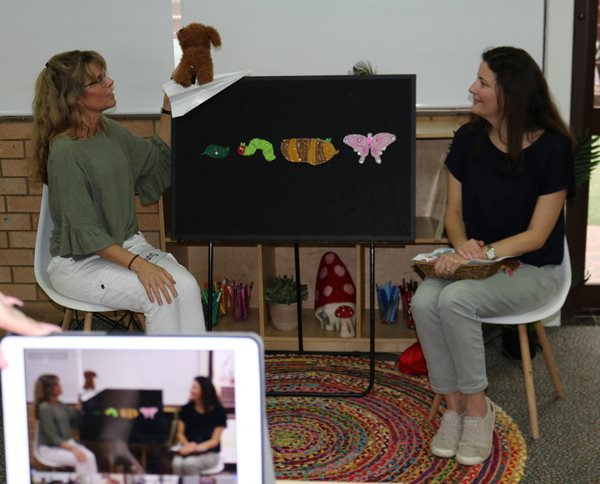 We are resilient, innovative and creative risk-takers – aren’t these the skills we wish to impart to the children in our services?
We are resilient, innovative and creative risk-takers – aren’t these the skills we wish to impart to the children in our services?
So I ask; if ‘The only thing you can really control is how you respond to things out of your control’ – how do you choose to respond in this new world of COVID-19?
St Luke’s Preschool Dapto – celebrating compassion and community
Centre Director Blake Stewart tells us how they have been connecting with their families, and how families have responded in an amazing way.
St Luke’s Preschool is a not-for-profit community-based preschool based in Dapto, NSW. We have a total of 124 children enrolled across the week, but by the end of March, we’ve had only 5-10 children attending preschool each day.
During the month of March, my team received requests from many families asking to withdraw their children from our service. In response, the Management Committee of St Lukes stepped in and provided a goodwill gesture of 3 weeks’ worth of fees waived for each child for the last three weeks of this term. This was put in place in order to keep enrolments until a clearer direction around the outcome of the virus and lockdown rules could be gathered moving into Term 2.
This offer was greatly appreciated by all our families and enabled them to reduce the financial burdens during this time. We have been overwhelmed by the strong sense of community and compassion shown by families. Some of our families generously offered to ‘pay it forward’, by allowing other families who may be experiencing financial hardship during this time to have up to 6 weeks of their fees waived.
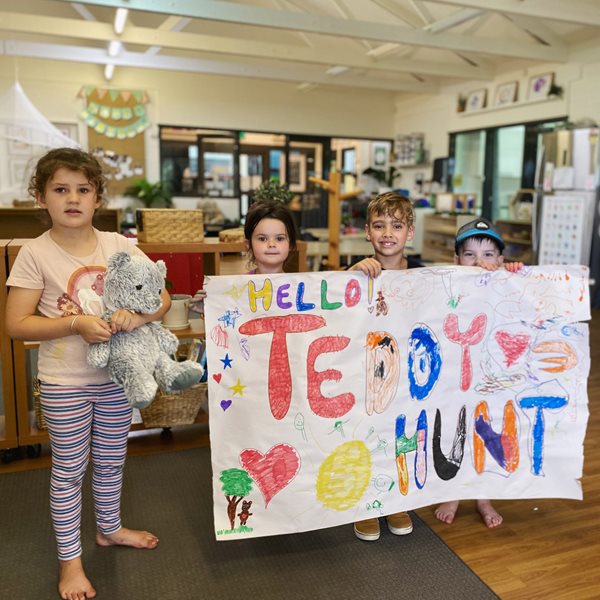
Stepping up hygiene practices and creating social stories
In response to COVID-19 we have increased our teaching strategies around good hygiene and cleaning practices. This has included inviting children to engage in the (chemical-free) cleaning practices around the service. Weekly cleans of the preschool have been ramped up to become daily cleans. This has included an additional bathroom clean, adding up to a total of three throughout the day.
A handwashing champion has been assigned on rotation throughout the day to ensure the children regularly wash their hands, and we have asked families to pick up and drop off in the outside foyer to eliminate all necessary contact within the classrooms.
Through strong partnerships with our local speech pathologists and occupational therapists, we have designed our own social stories to support children’s understanding and anxieties around the virus and social isolation. These stories have been sent to our families to use at home as well.
From the beginning of March, we developed a 4-phase risk minimisation plan that was communicated to all staff and families that consists of strategies and implications that would become necessary as the intensity of the virus increased. This risk minimisation plan was developed in consultation with all families and staff as a way to empower their input into the strategies that had already been put in place.
We have received such strong positive feedback from our families about the way we are regularly updating them with information and procedures we are embedding into our service.
Learning from home
As our numbers are significantly down this week, we are maximising our productivity by creating an office space in one of our preschool rooms to maintain social distancing and create At Home Education Packs for our families.
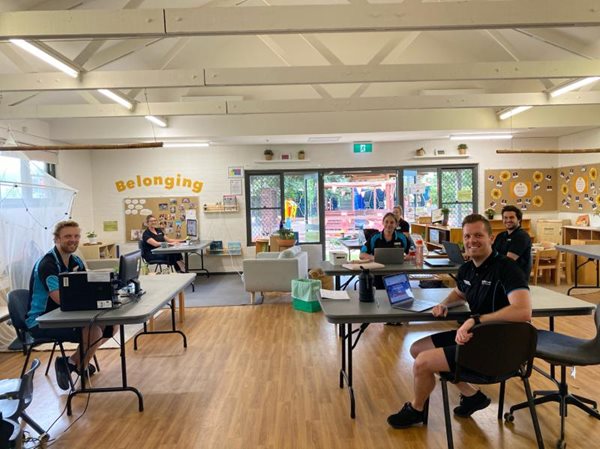 We have been designing weekly learn at home packs for our families that will be emailed via our internal digital platform as well as shared on our private community Facebook page.
We have been designing weekly learn at home packs for our families that will be emailed via our internal digital platform as well as shared on our private community Facebook page.
These packs link directly to our overarching curriculum and each staff member has prepared a different learning outcome linking to their teaching speciality.
We have also provided families with teaching resources to build their teaching capacity at home that links to the child’s developmental domains.
A significant time for our sector
I believe that this is a time of significance for our sector, and for families attending early childhood services. We have the opportunity to influence, impact and encourage our families in a way that has never been done before.
As early childhood educators, we believe in advocating for the wellbeing of all people, not just the children. We are aware that some families are faced with circumstances where they may be managing working from home as well as providing education, extra-curricular activities, care and emotional support for multiple children at different ages and stages of development.
Therefore, we believe that now more than ever there is a sense of urgency in creating significant, authentic and genuine partnerships with families in our communities.
How has your team responded during this crisis? We would love to hear your story.